SMITHSONIAN CENTER FOR FOLKLIFE & CULTURAL HERITAGE
La Cultura Cura: How Latinos Are Reclaiming Their Ancestral Diets
Whole Foods certainly didn’t invent chia seeds.
:focal(600x400:601x401)/https://tf-cmsv2-smithsonianmag-media.s3.amazonaws.com/filer_public/83/2b/832b7f43-688b-4699-822c-cb1a35f51f0d/marisol-cadena-food.jpg)
Editor's note: This article was originally published on August 7, 2017.
Maca root, chia seeds, spirulina, and cacao—you may know these highly dense nutrients, indigenous to Latin America, as “superfoods.” In recent years, these Mesoamerican ingredients have gained prominence in the United States, readily available in health food stores and popularized in “foodie” culture.
However, the desire for these ingredients, among health-conscious millennials like myself, is not to be conflated with this commercialized trend. Instead, it is rooted in a need to reclaim ancestral food knowledge and embrace alternatives to Western medicine. In other words, maca root, chia seeds, spirulina, and cacao are not only vitamin supplements for good health but a means for diasporic peoples of the Americas to connect back to cultures and foodways that colonialism and assimilation worked to erase.
A recent report found that, since 2007, there has been a 111 percent increase in Latina-owned businesses in California. While the report doesn’t list these ventures by type, Latina-owned micro-businesses selling and catering plant-based foods are emerging and leaving their mark in the greater Los Angeles area. At farmers markets, pop-up marketplaces, and community gatherings, these mobile entrepreneurs are expanding what we know as “traditional” Latino food.
Todo Verde and Malinalli Superfoods, both local to L.A., are two of the many emerging plant-based micro-businesses that promote healing and wellness through food. Motivated by the idea that food is medicine and essential for self-determination, these entrepreneurs bring healthy options to communities where it’s easier to find fast food than fresh fruit.
Both businesses primarily sell agua frescas and smoothies infused with ancient nutrients. Made with love and no added sugar, Todo Verde’s “Brown Power Smoothie” contains cacao, banana, oats, kale, dates, vanilla, and almond milk. Malinalli Superfoods sells their own powder jar called “Warrior Within,” containing spirulina, maca, cacao, chia seeds, and hemp, ideal for folks on the go. Rich in nutrients, one tablespoon added to any drink supplements a meal.
“This is the real fast food you should eat,” Malinalli co-owner Jenny Silva says.
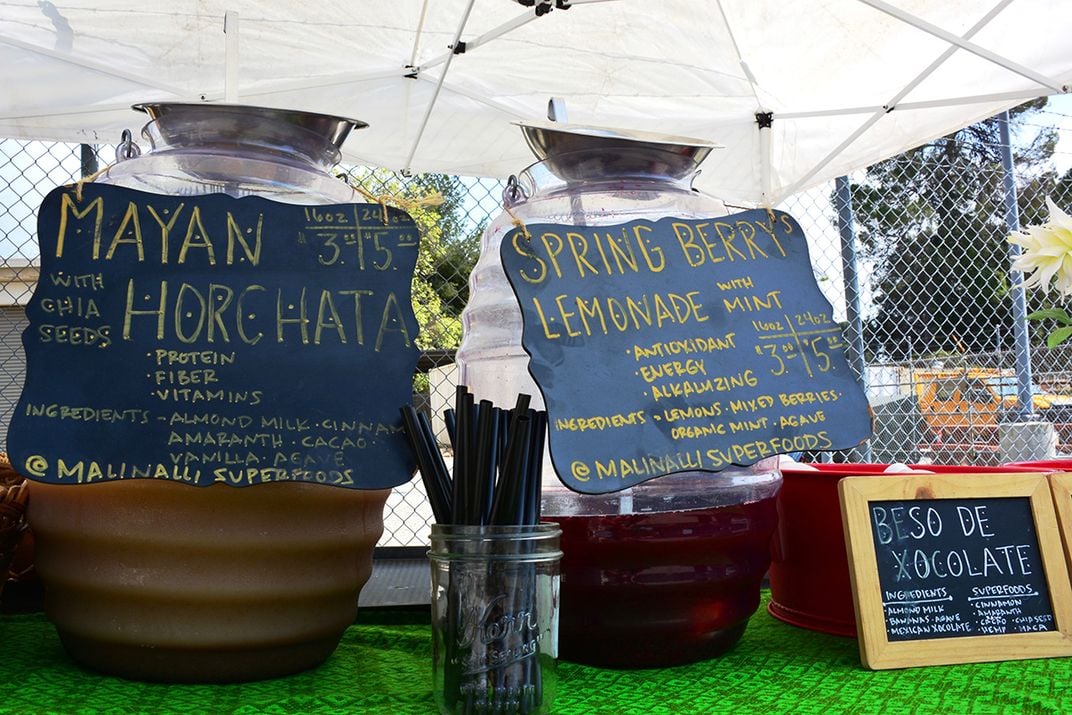
How Do You Say “Superfood” in Spanish?
When it comes to vegan and vegetarian lifestyles, mainstream media and food critics have largely ignored the contributions made by people of color in the name of food justice, contributions that have spearheaded cooperative farming efforts and preserved ancestral diets. “Authentic” Mexican food, for example, is often considered to be meat-heavy and fried, ignoring a rich cuisine of wholesome plants like nopales, chayote, quelites, and squash. In fact, beef isn’t even “traditional,” as it was introduced to the Americas during the Spanish conquest. Herein began the notion that European diets of bread and meats were superior to the indigenous diet of diverse herbs and crops like corn and tomatoes. Now, most consumers don’t realize these foods are ancient to Mesoamerican cultures.
For some people of color, quinoa, lentils, tofu, collard greens, chia seeds, and other “hip health foods” have long been staples; we’ve unintentionally practiced vegetarianism and veganism without even using these terms. Passing on of these recipes is a means of preserving histories, memories, and stories. For others—not just Latinos—they have not inherited these foodways because of the legacies of assimilation and capitalist systems that inhibited access to healthy foods.
Despite this, some brown folks who didn’t grow up consuming plant-based diets, such as the owners of Todo Verde and Malinalli Superfoods, are taking health into their own hands. They’re (re)learning and (re)creating healthy recipes, and in turn spearheading a movement to re-root Latinx* communities to the plant-based diets of their own lineages. Los Angeles ecofeminista La Loba Loca calls this “abuelita knowledge”: “bodies of knowledge that have been oppressed, stolen, silenced, gone underground, hidden themselves in between spice jars in kitchen cabinets, locked away but remembered and restored when necessary.”
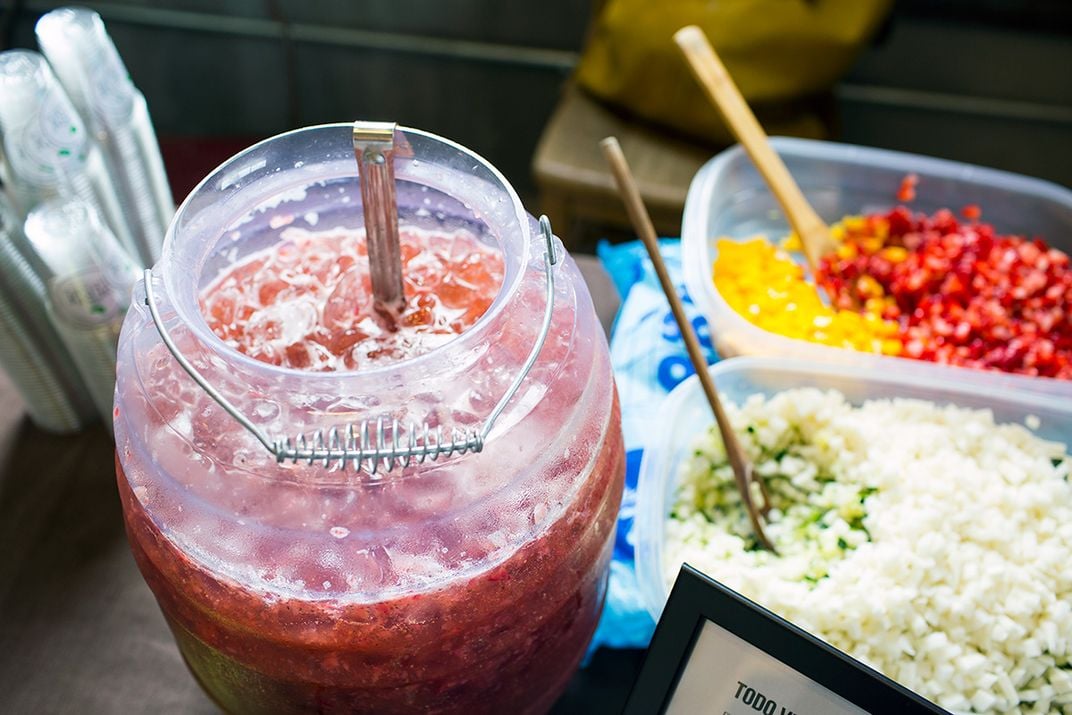
In the way that superfoods and vegetarian diets are not new inventions or practices, the entrepreneurial hustle to maintain a food business in L.A. without actually owning a brick-and-mortar shop is also not uncommon in the Latino community. For generations, many Latinos have financially sustained themselves by selling produce on the street—bags of fresh-picked oranges; fruit cups saturated with tajín, limón, y sal; or fresh grilled elote (corn). Street vendors have not only preserved cultural economies but also contributed to the commercial fabric of Los Angeles, contributing $504 million to the local economy and providing affordable produce in neighborhoods where it is lacking.
Building on this legacy, U.S.-born Latino entrepreneurs of this millennial generation are making their presence known with a different hustle, focused on wellness but still with a rasquache ethos: to make abundance with few means. Using social media to advertise and skill share, vendors are recovering cultural foods through daily acts of cooking and digital storytelling, ultimately calling attention to the health crisis (high rates of diabetes, heart diseases, high blood pressure, and cancer) disproportionately affecting communities of color.
“This food is of our ancestors,” Silva explains. “We are bringing back this health to our communities because there are no health stores near us. Our business is about bringing health awareness that this food is actually in our DNA.”
The perception that organic or meatless foods are by and for white hipsters and hippies is the very idea these micro-business are working to disrupt. Even though there is a rise in Latino health food businesses, there is still skepticism and even pushback to accept these as “Latino foods.” This is partly because many working-class communities of color are experiencing the pressures of gentrification, as well as the impacts of displacement. New cafes, juice bars, and high-end restaurants open up, funded by investors with no relationship to the communities.
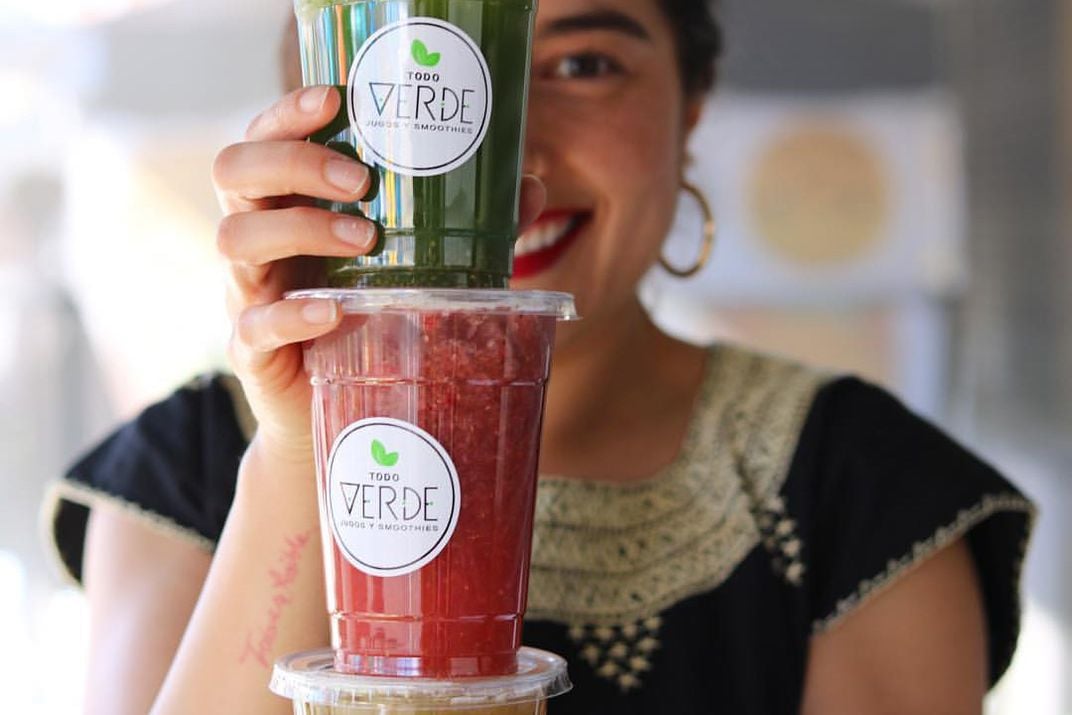
While gentrification, the contemporary colonialism, destabilizes vibrant communities, these Latino entrepreneurs are investing in their own communities. By empowering younger generations with abuelita knowledge, they can ultimately work to undo another manifestation of colonialism: the imposed standard American diet—white sugar, white flour, and high-fructose corn syrup.
In the 1920s, Mexican mothers were targeted by federal Americanization programs to speed up the assimilation process. It was believed that a diet of beans brought on malnutrition and was largely detrimental to the integration of Mexican families into American society. These programs largely ignored structural poverty and segregation as barriers to good health. Eurocentric ideals prevailed, separating many people of color from the healthy and sustainable practices of their ancestors, causing us to view what is now known as “veganism/vegetarianism” as far removed from everyday realities.
As mainstream media has whitewashed vegan and vegetarian lifestyles, the challenge to reclaim plant-based diets for Latinos and other people of color is a collective pursuit for health and respect of indigenous knowledge.
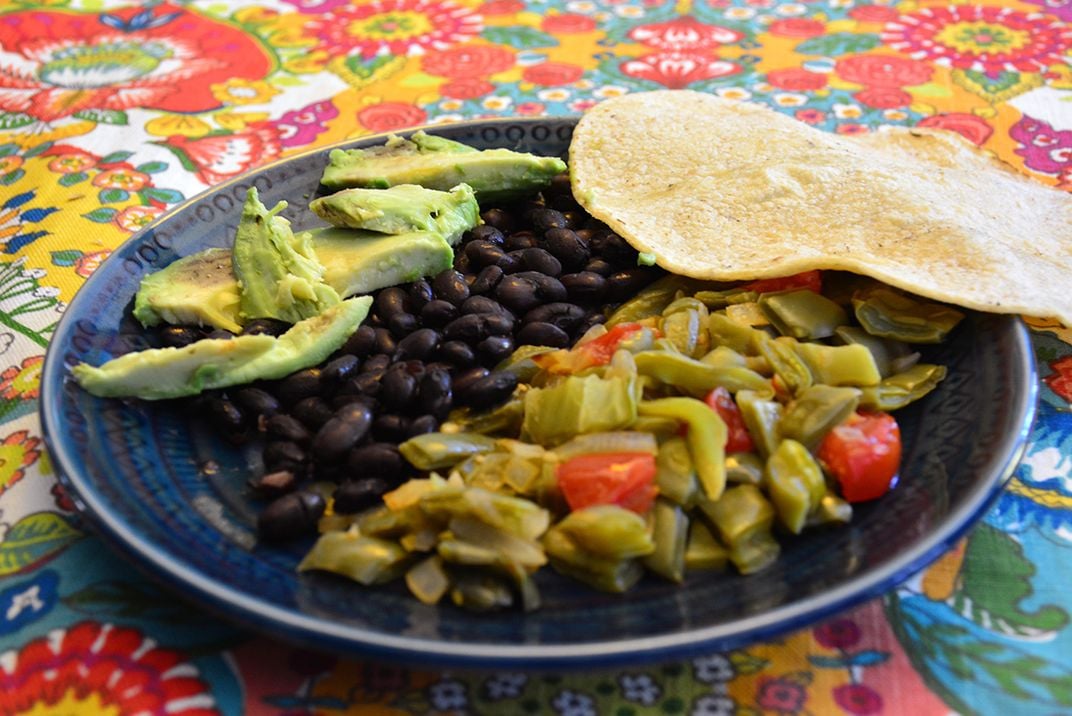
Food Is Medicine
The vegetarian cookbook Decolonize Your Diet by Luz Calvo and Catriona Rueda Esquivel has become a seminal resource for people wanting to reconnect with their ancestral foods. After Calvo was diagnosed with breast cancer, the pair investigated cancer-fighting foods and found that the diets of rural Mexico and Central America (cactus, squash, corn, wild greens, nuts, and seeds) were protecting people from certain illnesses. With this insight, Calvo and Rueda set out to learn more about pre-conquest diets—before wheat, beef, cheese, sugar, and frying pans drastically altered Mesoamerican diets.
Similarly, Todo Verde founder Jocelyn Ramirez turned to a plant-based diet when her father was diagnosed a second time with cancer. She helped modify his diet to include more vegan meals, which helped him make incredible progress when undergoing treatment.
Considering the exorbitant costs of healthcare treatment, perhaps more will see plant-based diets as legitimate medicine.
For those who don’t want to give up their carne asada tacos for potato cauliflower tacos just yet, there’s no pressure. As the owners of Malinalli Superfoods reminded me, being health conscious and eating plant-based foods doesn’t necessarily mean excluding meat. While they only sell plant-based foods, Silva and Ruben Pena don’t label themselves as vegan or vegetarian because being healthy and sustainable is about serving your body, and sometimes that means having a carne asada taco at your familia’s gathering.
At the heart of the matter, it’s about shifting our preference and dependency on artificial foods as we reclaim nutritious and sustainable traditions.
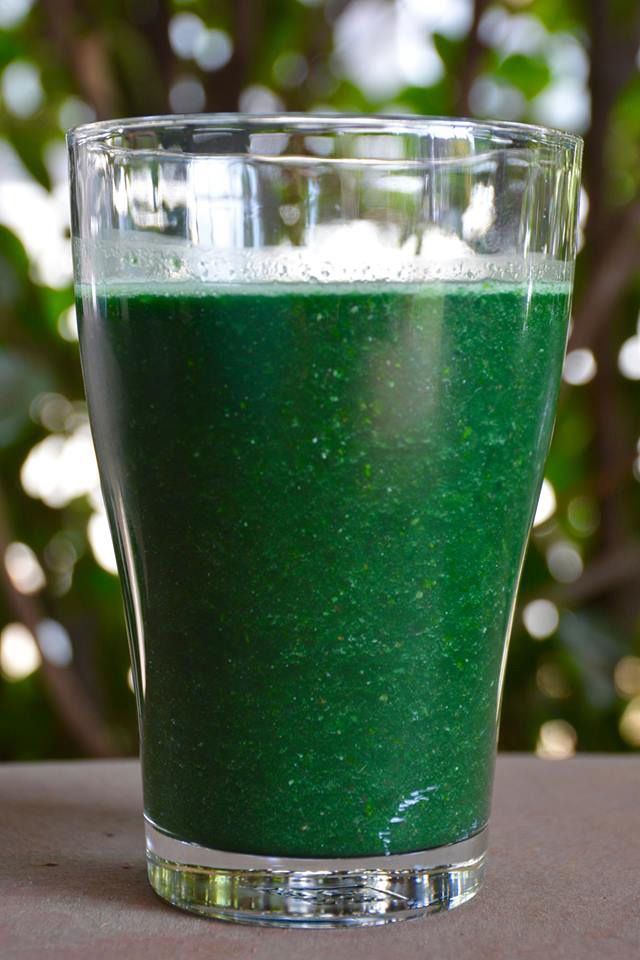
Green Morning Smoothie with Superfoods
Recipe by Marisol Medina-Cadena
- 1 cup greens (spinach or kale)
- 3 ice cubes
- 1/2 banana
- 1/2 cup frozen mango or peaches
- 1 tsp. spirulina
- 1/2 tsp. chia seeds
- 1/2 cup water
Blend all ingredients together and enjoy chilled.
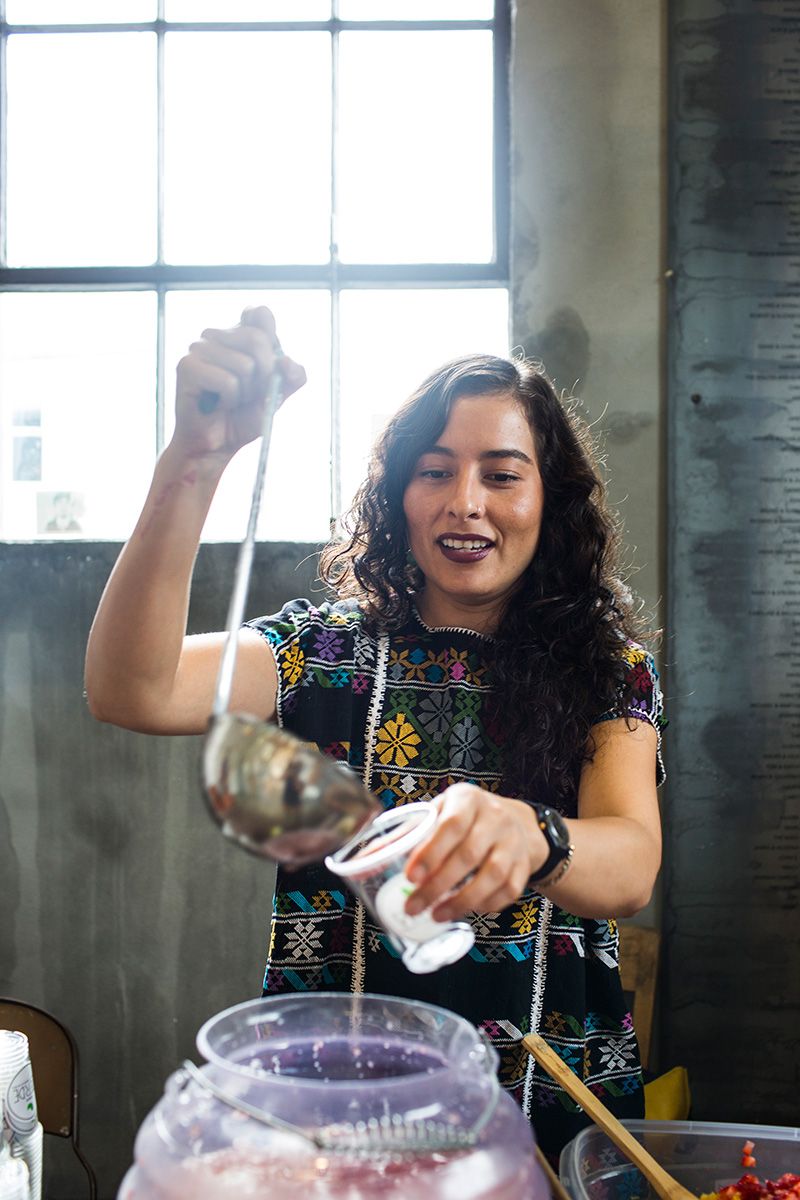
Other Latinx Plant-Based Food Businesses in Los Angeles
- Plant Food for People (food truck)
- Tacos Sín Karma (mobile vendor)
- Un Solo Sol (restaurant)
- Wild Living Foods (restaurant)
- Olga’s Naturally (restaurant)
- Vegan Moni (catering)
- Cocina Manakurhini (catering)
- Spirit Plate (catering)
*Latinx (pronounced “Latin-ex”) is a term born out of a collective move to go beyond the male-female binary to include people of all genders.
Source
George Sanchez. “Go After the Women: Americanization and the Mexican Immigrant Woman, 1915-1929,” in Mothers and Motherhood, Eds Rima D. Apple, Janet Golden (Columbus, Ohio State University Press: 1997).
